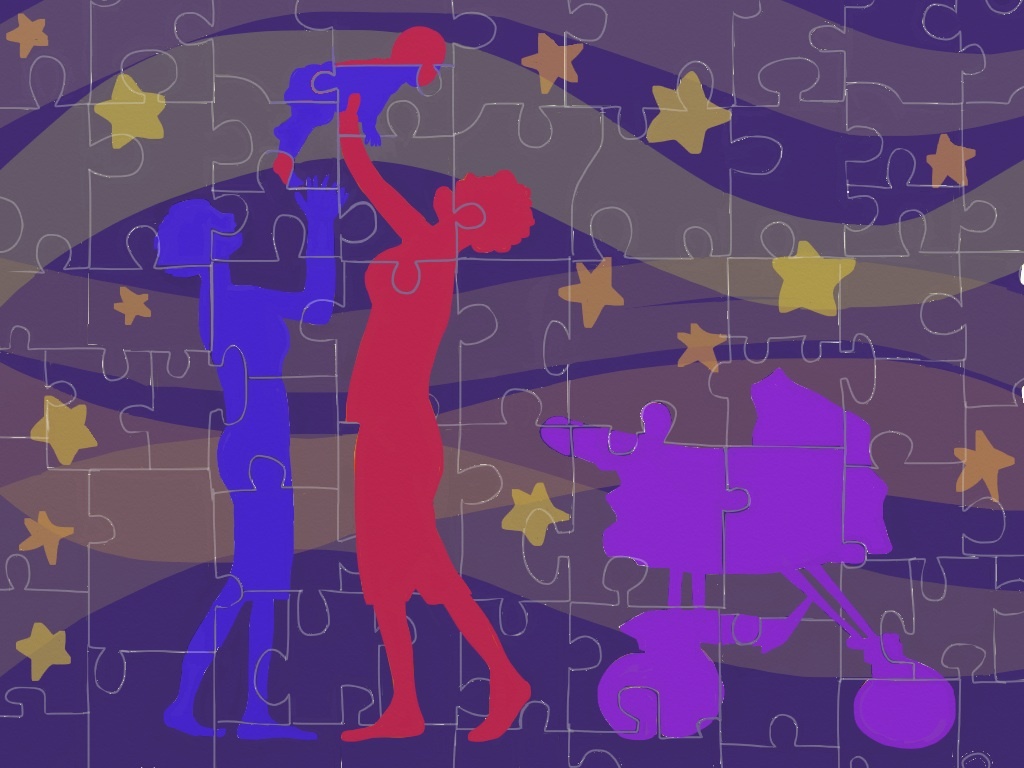Illustrated by Leah Rubin-Cadrain (@leahaviva)
Strangers and new friends typically find out I have two moms in the middle of one of my long-winded stories. I'll start rambling about something or other and say, "And so my mom said," and then a few minutes later, still rambling, I'll return to, "But my mom was away so," at which point a bored listener will inevitably perk up.
"Wait," my storytelling-victim interjects, blinking heavily. "I thought your mom was there."
"No, that was my other mom," and the story will have to be abandoned, as there are now larger topics to address and many questions to answer.
Back in the day, this would entirely derail a conversation (aka "me talking"), and I would end up telling my stranger/new friend my whole birth story instead of whatever boring story I was trying emphatically to tell. Nowadays people react to this information with a restrained nod, trying not to miss a beat.
"That's right," they'll nod coolly. "Your parents are gay, and I totally get that, and I'm not surprised, and I'm not gonna ask you any questions."
But inevitably they crumble, and a few moments later I get:
"Can I just ask you one thing? What do you call... your... moms?"
This question is difficult, because it is both personal and political. This feels to me like the sophisticated version of the needling question "but which one is your real mom?" except of course this question, about who gets to be called "Mommy," is more legitimate, and from a quick scan of the blogosphere, it is obvious that even insiders (lesbian new moms) are losing sleep over this one.
Before I was born my moms were already getting this question. I imagine myself in utero, tumbling in amniotic fluid, already worried about hurting feelings. "Gosh," I think, "shit's gonna get real when I come out of here. I better have some answers for the grownups. Which one gets to be 'Mommy'?"
As a little kid I did not see the big deal. A rose by any other name would smell as sweet. In fact, as a child I actually replaced the names of things with the names I felt they should have (like the mental condition apraxia, but temporary, and for toddlers). Water chestnuts, for example, I called "bostons." I didn't know that Boston was a city, but I had heard the word peripherally because two of my uncles lived there. We ate Chinese food a lot. I would ask for "bostons," and my parents would order Chinese dishes that featured water chestnuts. I would crunch them and hear the satisfying, crisp sound of "boston, boston" as I chewed.
Then there was my vinyl wallet that I used to hold my coins or to hold nothing at all. I called this wallet "memory." I would scratch the vinyl and hear the word "memory." My older cousin Michelle remembers that I lost the wallet when I was 3, and we frantically searched my bedroom as I cried, "Where is my memory?!" It seemed tragically poetic to her, but to me it was just onomatopoeia.
So I deflected the "Mommy" semantics conversation as I got older. I figured that English just doesn't have a word for the second of two moms, a separate but equal term. I explained that although I called my biological mother "Mom" and often, but not always, called my other mother by her first name, it was meaningless and had simply evolved that way, with no regard to who gave birth to me and all that jazz.
But I'm afraid that there is a more uncomfortable truth here, and it's the one that kept me up as a fetus, worrying before I was born. You can't negate the fact that the person who carries you for nine months and then breastfeeds you and then has similar genes to you is a special lady. Whether you scored a "mother of the year" or a total deadbeat, chances are you feel something extraordinary and charged toward your biological mother. Within my nuclear family are three people: me, the mother who mothered me, and the mother who birthed me and mothered me. Then of course there's the dog and the cat, who have done altogether very little for me.
I have struggled to define for people the role of the "other mother." I have always told people that I call both parents "Mom" consistently, but looking back, this was really only true when I had computer trouble. When something wouldn't print or I couldn't retrieve the latest draft of my English assignment, then and only then would I shout, "Mommm!" and await whoever happened to come up the stairs. I think this was because both mothers demonstrated the same level of technological ability and a matching desire to staunch the oncoming tidal wave of homework hysteria.
Over time I have come to call both my mothers by their first names. I started doing that occasionally when I was little, maybe 8 years old, but later it became an all-the-time thing. Everybody wants to be "Mommy," and I just don't want to hurt anyone's feelings: Best to just use first names, imbuing "R" and "M" with all the intoxicating significance of "Mom" and "Mom."
I could, if I felt so inclined, call them both "water chestnuts," just to mess with people. I could say, "Guess what?! My water chestnuts can legally get married now!"
I have a unique and separate relationship with each of my mothers, regardless of what I call them. I seek each out for different reasons, and I feel gratefully spoiled to come from a two-parent home, to be smothered and hassled by not one but two parents, all to my worried, privileged self.
Read more at two-and-a-half-women.tumblr.com.
